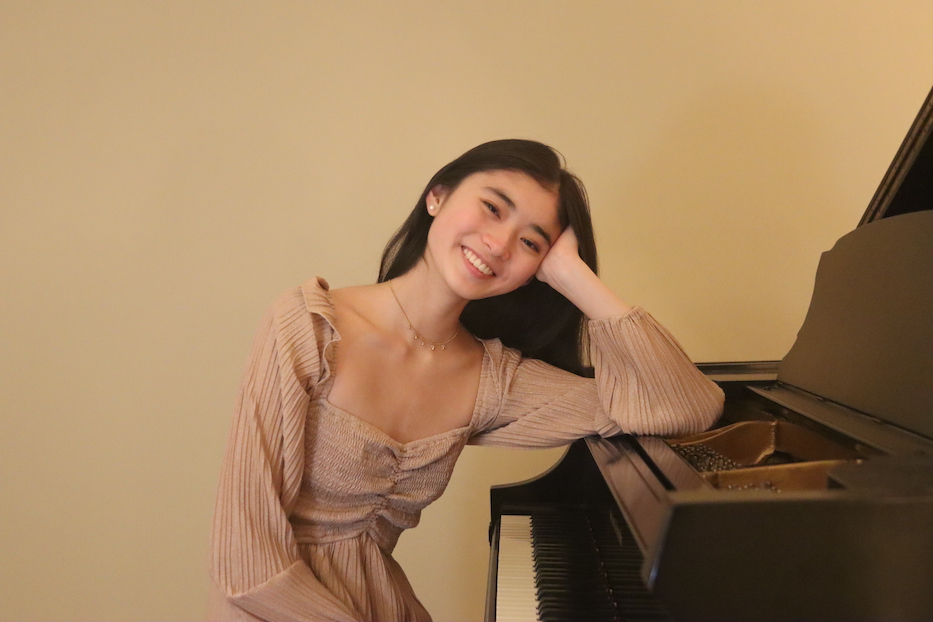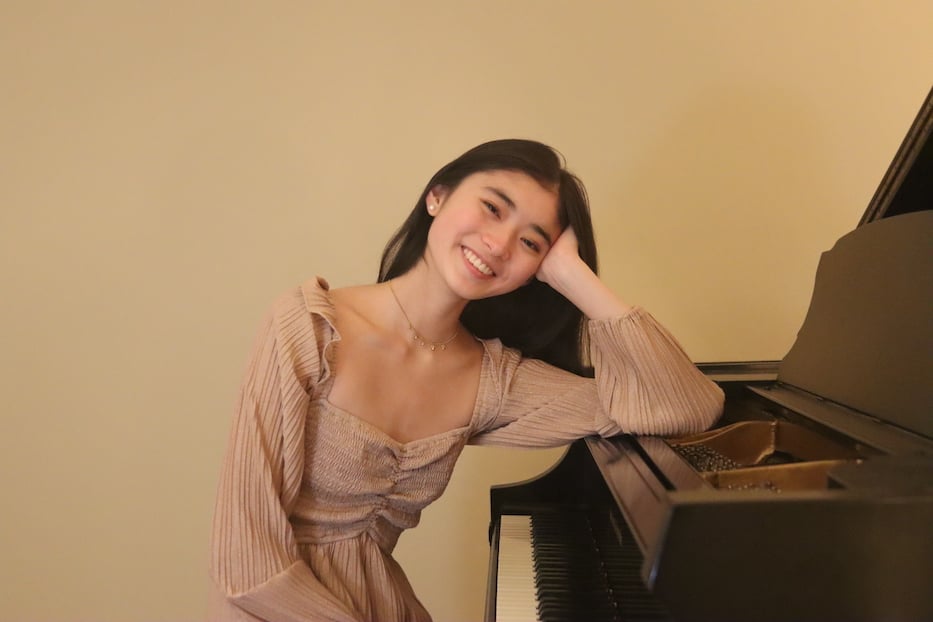
Bethany | Culture & Community | Education & Youth | Music | Arts & Culture

Marin Korenaga. Photo courtesy of the artist.
Marin Korenaga looked to songwriting as a way to find her voice. Now, she's bringing her talent to a national stage—and hoping to grow her craft with other young artists from across the country.
Korenaga, a Bethany resident who is a senior at Amity High School in Woodbridge, is a 2023 recipient of a YoungArts Award in songwriting, which will send her on to YoungArts Week in Miami next Monday. This year, she is one of 13 students from Connecticut to qualify for the week-long intensive, and of just one of two from the state in the songwriting category.
Fellow Connecticut-based recipients include Laurel Aronian, Stephanie Chang, Alexander Halpern, Liam Melvin, Audrey Lim, Ava Maha, Caroline McAleavey, Varun Ramamurthi, Soren Rasmussen, Ethan Shames, Caleb Sharp, and Alice Walker. She is the only songwriter from the New Haven region. See all recipients here.
"I've always sought to create a community for songwriters online, but having that in-person experience is unreal, and I'm just really excited for it," she said in a recent interview over Zoom. "I think it's a way of expressing things that just feels authentic and from myself."
"The amount of work that she puts into everything that she does, to see some type of acclaim and success, my heart just is thrilled for her," Amity High School Counselor Karen Waterman said in a phone call Tuesday morning. "The amount of time and passion that she puts into all of her things—for her to be recognized is extremely rewarding."
For Korenaga, music has always been a way to tell her story. She began to play the violin before her third birthday, and then added piano when she was five. By the time she was nine, she was writing songs in Japanese, then English. She laughed remembering her first full-length composition, written on the heels of an argument between her family members. “It was about why you shouldn’t argue,” she said with a smile. She acted it out in multiple voices with stuffed animals. Then she returned to the keyboard for more.
"I started to realize that my music, like, did make a difference," she said. The older she got, the more complex the songs became. Her lyrics deepened as she made the transition from elementary to middle school, and middle to high school.
Waterman, who first met Korenaga when she was a freshman in August 2019, remembered how nimbly she balanced instrumental music, songwriting, academic work, and her extracurriculars from the very beginning of high school. It always seemed that she was applying to something—sometimes a music camp, sometimes a songwriting competition. “She's just so exceptional in all areas,” Waterman said. “She's pretty extraordinary.”
Then the second semester of her freshman year, Covid-19 hit. Schools closed their doors and made the remote pivot. Music lessons moved temporarily online. Around her, the world was turning upside down. At school, she balanced songwriting alongside a growing interest in politics, including the nonpartisan youth debate group Junior State of America.
At home, she watched as hate crimes rose against Asian Americans, the news so sudden and violent that she struggled to process it. She saw people take to the streets to protest the state-sanctioned murder of George Floyd. From lockdown, she listened as the former occupant of the White House turned toward hate speech and white supremacy and away from science and facts. The isolation and upheaval of the pandemic got to her, she said.
"It was just really hard for me to take in," she said. "One day I just sat down in my basement, on my piano stool, and I decided that I could write a song about it. I've done it before with my feelings about other things in the past."
As she wrote, she could feel the tension leaving her body. It was as if music, and songwriting in particular, had a way to heal what she was feeling in her heart, she said. Still in the thick of the pandemic, she started a YouTube Channel, posting her music online. Her keyboard and her microphone became a vital outlet, giving her a space to work through "the tension that I'd been feeling for so long."
"All of the movements going on, it really inspired me," she said. "I felt like I really didn't know how to help. I started to realize that songwriting is just like, a way that I can express how I'm feeling so deeply. Sometimes when I write things, I don't even know that I wrote it—it's just like, a really great tool for using my voice."
Her work gave words and space to not just her own anxieties, but the anxieties of many of her peers. She wrote about mental health and suicide prevention. She wrote her way through the January 2021 attack on the U.S. Capitol, and later the U.S. Supreme Court as it struck down Roe v. Wade. When she read, horrified, about the shooting at an elementary school in Uvalde, Tex. last May, her mind flashed to the Sandy Hook Elementary School shooting, and she turned to her keyboard as a form of solace.
"It really wrecked me," she said. "In Connecticut, we are so close to that community."
Her peers and teachers alike were often moved by the music. At some point last year, Korenaga's violin teacher, Yale-based musician Wendy Sharp, pointed to YoungArts as a competition she might want to apply to. She submitted her song "Marianne," written a few years ago, and two new compositions she wrote over the summer. As she worked on one, titled "Save Me," she folded in lessons from her musicology and poetry classes at school. The song helped her probe the difference between "being lovely and being alone," she said.
In the finished piece (click on the video above to listen), she comes in crooning, keys soft beneath her voice. Summer's lonely/Finished half the books on my shelf, she sings with a knowledge and emotional exhaustion that seems well beyond her years. Her voice stretches over the track, testing its ebb and flow in real time. It blooms, thick and melancholy, then just as quickly makes itself small and winds skyward.
That expansive quality is there again in “Bouquets,” where she balances buoyant, persistent keys with vocals that are immediately sure of themselves, then catch on something. She shifts, funny and ironic for a moment before she finds and holds the hook. It is flecked with a heavy dose of Lana Del Rey, Taylor Swift, Billie Eilish and some early Dolly Parton for good measure, but it’s her own, with a sense of certainty even in the space between words.
She wasn’t expecting to win, she said; she’s only ever received regional recognition for her songwriting. When she received the news that she had won last month, she was both surprised and elated, she said. She added that she's looking forward to meeting fellow singer-songwriters from across the country.
"It just gives me something to, like, always look forward to and to remind myself to keep writing songs. Not only because, you know, you won this award, but also because it means so much to you. And I feel like it means so much more now that I've won it for something that I truly, truly am passionate about."
"I think songwriting ... " she trailed off for just a moment, and then picked up the thread. "It's like the culmination of who I am as a person.”
Learn more about YoungArts at their website. Listen to some of Marin Korenaga’s work here.

